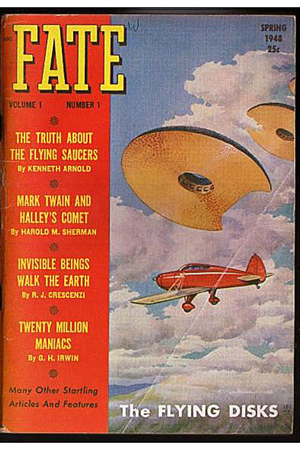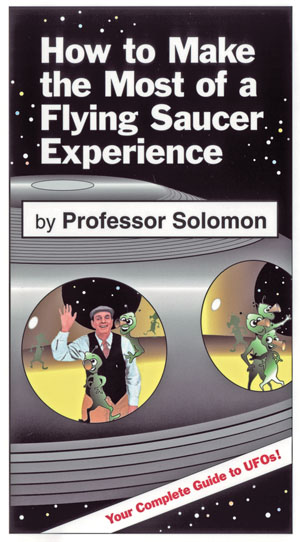
FATE MAGAZINE, SPRING 1948, ©
REPRINTED WITH PERMISSION
The Man Who Invented
Flying Saucers
Ray Palmer has been called “the man who invented flying saucers.” Who was Palmer? And how could he have been responsible for UFOs?
Palmer was the editor of Amazing Stories, a popular science-fiction magazine. From 1945 to 1947 he ran a series in Amazing that became known as the Shaver Mystery (or to many, the Shaver Hoax). Author Richard Shaver wrote about a subterranean world inhabited by “Deros.” Traveling about in flying disks, these demonic creatures were responsible—by means of secret rays—for most of the ills of Mankind. Shaver claimed to have actually visited “the caves,” and insisted his stories were factual.
And Palmer (who edited and rewrote the stories) presented them as such. “The most sensational true story ever told,” he announced. He also printed letters from readers who claimed to have had contacts with the Deros, or to have spotted their ships in the sky. “We all know something strange is going on,” editorialized Palmer. “It has happened to thousands of us.” The circulation of Amazing Stories skyrocketed, until the publisher—worried that it had gotten out of hand—quashed the series.
Years later, Palmer’s assistant editor told how the series had originated: “Early in the ’40s, a letter came to us from Dick Shaver purporting to reveal the ‘truth’ about a race of freaks, called ‘Deros,’ living under the surface of the earth. Ray Palmer read it, handed it to me for comment. I read a third of it, tossed it in the waste basket. Ray, who loved to show his editors a trick or two about the business, fished it out of the basket, ran it in Amazing—and a flood of mail poured in from readers who insisted every word of it was true because they’d been plagued by Deros for years.” (Quoted in Cheap Thrills: An Informal History of the Pulp Magazines by Ron Goulart.)
For those who consider Palmer to be “the man who invented flying saucers” (as ufologist John Keel has dubbed him), the Shaver episode speaks for itself. It was the succès de circulation of a magazine editor who has been described (by skeptic Martin Gardner) as “a shy, good-natured, gentle, energetic little man with the personality of a professional con artist,” whose “primary motive was simply to create uproars that would sell magazines.”
But Palmer didn’t stop with the Deros and their flying disks. He went on to found and edit Fate magazine, which reported on UFOs and other mysteries. And in Fate he promoted a new theory: that flying saucers came from Outer Space. The second issue featured an article by Kenneth Arnold, titled “Are Space Visitors Here?” (Arnold was the pilot whose UFO sighting in June 1947 inspired the term “flying saucer,” and prompted a wave of similar reports.) Palmer also coauthored a book with Arnold; founded a press that specialized in UFO publications; and (in the opinion of some) mischievously transformed the alien spaceships of science fiction into the flying saucer phenomenon. A hunchbacked dwarf (due to a childhood accident) with a wicked sense of humor, Ray Palmer has been accused (by Daniel Cohen in Myths of the Space Age) of having “programmed the imagination” of “an entire generation of flying saucer enthusiasts”—a programming that spilled over to the general public.
It is fascinating to look through issues of Amazing Stories edited by Palmer, and examine the illustrations. There are disk-shaped spaceships and bug-eyed aliens—from the decade before the first sightings of flying saucers. Was the man prophet…or progenitor?
For more on flying saucers see How to Make the Most of a Flying Saucer Experience.
For more on Ray Palmer and Richard Shaver see Visitors to the Inner Earth.


